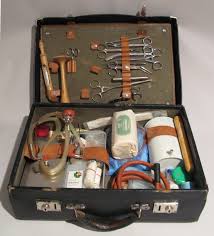 Right now, in a social media groups all over the country, there is a conversation happening about what is or is not “too medical” for “good” midwives.
Right now, in a social media groups all over the country, there is a conversation happening about what is or is not “too medical” for “good” midwives.
You know the one… on one side is the “midwives should need nothing but trust in their hearts” camp and on the other there is the “midwives should always bring an RV with a surgical suite inside it… just in case” camp. (Kidding, but you get the jist!)
It’s a great theoretical conversation, but it tends to be a little on the naive side.
So, lets bring some real life in here…
 In real life, midwives are caught on a seriously thin line between natural and medical.
In real life, midwives are caught on a seriously thin line between natural and medical.
At every single birth they have to balance on that line knowing that going over – either way – could result in a catastrophically bad outcome
not only for the mom/baby but also for the midwife or even for the whole midwifery/homebirth community.
So, while it’s admirable to spend some time considering the implications of medicalized childbirth, waxing poetic about what midwives “should” or “shouldn’t” do or carry implies that you feel like you’re more qualified to guess what will happen at every situation than an experience midwife who’s been in a multitude of different situations.
After all, it’s one thing for you to talk about what YOU want YOUR midwife (should you choose to have one) to do at YOUR birth, but it is another thing entirely to imply either that you should be able to decide for others what they should have at THEIR births, or what all midwives – in general – should or shouldn’t do or carry, because…
In real life, the oversimplified view that medical intervention is never appropriate shows a general lack of understanding about the ways birth CAN go wrong.
I live on a farm where the animals free range and give birth on their own time, in their own way, however that comes naturally,
and the truth is, completely natural birth can result in the death of mom and/or baby…. due to various malfunctions in the natural process.. EVEN WHEN LEFT COMPLETELY ALONE.
 The trick of midwifery is continually evaluating the best ways to determine if the natural process is proceeding appropriately and then how best to proceed if it’s not.
The trick of midwifery is continually evaluating the best ways to determine if the natural process is proceeding appropriately and then how best to proceed if it’s not.
Since everyone (I hope) agrees that we shouldn’t leave mothers/babies in the field to die midwives strive to be prepared for any eventuality, however remote.
That doesn’t mean that we go to births hoping to use every procedure or potion we have in our arsenal, it means that we go to births hoping that if there is an appropriate procedure or potion, we will have it in our arsenal!
I know that I, and most of the midwives I’ve ever spoken to, have seen bad outcomes in situations where the midwife did too much as well as in situations where the midwife did too little. They are constant reminders of the thin line we walk.
It’s important to remember that most midwives have dedicated a very significant portion of their lives to rigorous training and education regarding what is/is not appropriate, and how to best walk that line.
I’m not saying there aren’t bad midwives.. there are (and bad doctors, and bad nurses, and bad cops, and bad clergymen but that’s a subject for another day).. but it doesn’t really have anything to do with what they carry in their bag of tricks – it has more to do with not having adequate training/understanding about when it is or is not appropriate to use the things they carry.
 Finally, and probably most important, in real life we must remember that midwives are human beings with strengths and weaknesses – triumphs and tragedies, and sometimes deep scars from brutal life experiences
Finally, and probably most important, in real life we must remember that midwives are human beings with strengths and weaknesses – triumphs and tragedies, and sometimes deep scars from brutal life experiences
(actually, they often have more of those than the general population since midwives are often the kind of people who don’t’ shy away from complex and heartbreaking situations).
They are going to be as different as snowflakes,
and you’ll never know what happened to make one feel like it’s really important to bring oxygen every single time or another feel that it’s important never to bring it.
So, if you know you want a midwife who is just going to have her wooden fetoscope, ASK
if she’s comfortable with that she will tell you. If you will feel better knowing a midwife has the “big guns” in her bag, ASK about that, too.
Honestly, you can’t even make it to Midwife without having some seriously thick skin… you’re not going to hurt our feelings, and we’re not going to be too torn up that you didn’t choose us (especially if what you want is seriously outside of our comfort zone)
because we will know that we weren’t YOUR midwife.
And that, despite all the talk about method and technique, is the biggest difference between midwifery and medicine;
that we aren’t taught to ignore and suppress our  feelings,
feelings,
that we allow ourselves to care about our clients on a deeply emotional level.
It’s that difference that gives us permission to know that – like finding friends or a mate – not every match is a “match”.
So, carry on with your conversations – of course – but please keep in mind that you’re talking about living, breathing, feeling people who have real lives
which they live on a thin and terrifying line
and usually just want nothing more than to help you have the safest, healthiest, and most perfect birth experience you can imagine.